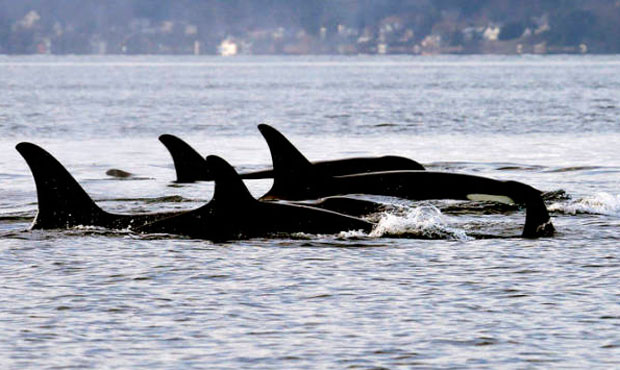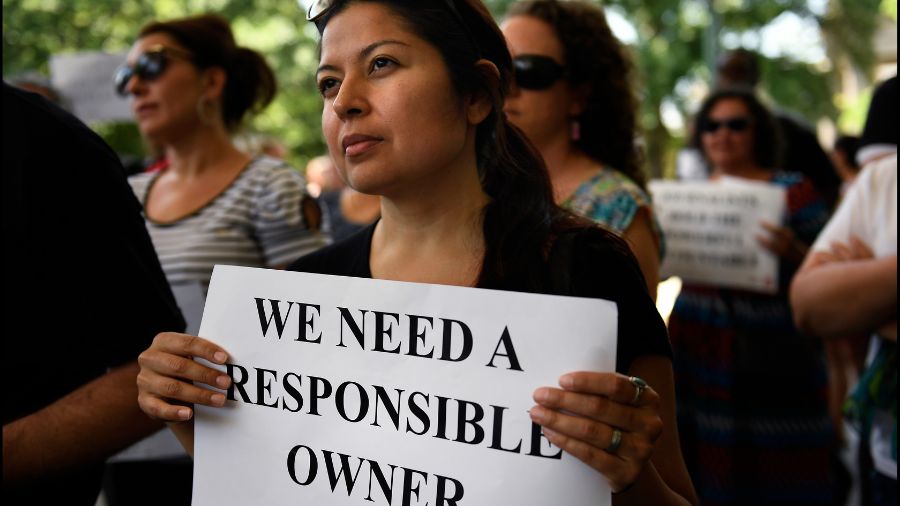Go slow and no fishing zones among initial orca recommendations
Sep 25, 2018, 2:13 PM

Southern resident orcas. (AP)
(AP)
Slow zones for boats, studying harbor seals, and creating no fishing zones around orca pods are among the initial recommendations from Governor Jay Inslee’s task force to save the region’s killer whales.
RELATED: Killer whale lawsuit has “pretty good case”
On March 14, Gov. Inslee signed an executive order establishing the Southern Resident Orca Task Force. The group has been developing a long-term plan to aid the Southern Resident orca. Two reports with recommended actions were ordered by the governor — on due by November 2018, and another by October 2019.
The first product of the task force was published Sept. 24 — a draft report and potential recommendations. The public is asked to weigh in on the draft recommendations by October 7.
There are three main aspects of the report: lack of prey; disturbance from noise and vessel traffic; and toxic contaminants. A series of actions are suggested for each.
Noting that orca primarily eat Chinook salmon, the task force recommends an “all-H” approach, which means investing in habitat restoration, hatcheries, hydropower (creating passageways around dams), and harvest (regarding commercial and recreational fishing).
The report also notes that there are other predators affecting the orca diet, such as pinnipeds: “since the adopting of the Marine Mammal Protection Act in 1972, West Coast seal and sea lion populations have increased, and with increasing pinniped populations they have consumed more salmon.” Birds and other fish are also predators threatening the Chinook supply.
Vessel noise causes orca to spend time avoiding the disturbance, instead of foraging.
Contaminants are also of concern. The report cites a range of chemicals from PCBs (polychorinated biphenyl) to PAHs (polyaromatic hydrocarbon) coming from paints, plastics, creosote-treated wood, and personal care products. Many don’t break down easily in the environment and enter the food chain. The chemicals threaten orca metabolism and some are linked to impaired immunity and organ damage. Many contaminants come from stormwater runoff, pharmaceuticals, sediment, and consumer products.
Climate change is another threat that the report points to, which is expected to “exacerbate exiting stresses on Chinook salmon populations that Southern Residents rely on.” Climate change is expected to warm stream and ocean temperatures, lower summer stream flows, and raise sea levels.
Orca recommendations
The task force recommends a range of actions to be used independently or in combination. For habitat, for example, it recommends estuary restoration and increasing criminal prosecutions for violating habitat protections and water quality regulations. It also says the state should increase hatchery production.
“Go slow” zones are also among recommendations for vessel traffic to lessen noise pollution, and restricting the number of whale watching boats on the water.
There are also a few harvest recommendations:
- Determine when and where orca are foraging, and in turn, close that area to fishing for that time.
- Fund and support a buyback program fro state commercial fisheries to reduce impacts on Chinook stocks.
- Reduce the allowable bycatch of Chinook in Alaskan fisheries.
- Implement a buyback program for remove fishing gear that has a “high release mortality of Chinook,” or transition to gear that has lower Chinook mortality.
When it comes to pinneped predation, the task force recommends that the state study pinnepeds to better understand their affect on salmon populations. It is also recommends the removal of some artificial sites where seals hang out — buoys, docks, etc.
The full report with recommendations can be read here.
The report comes after a couple high-profile deaths in the Puget Sound orca community. One ailing killer whale is presumed dead after biologists attempted to save her. She was valued as a breeding member of the pod. Another orca lost a calf, which she kept afloat for weeks after its death.













